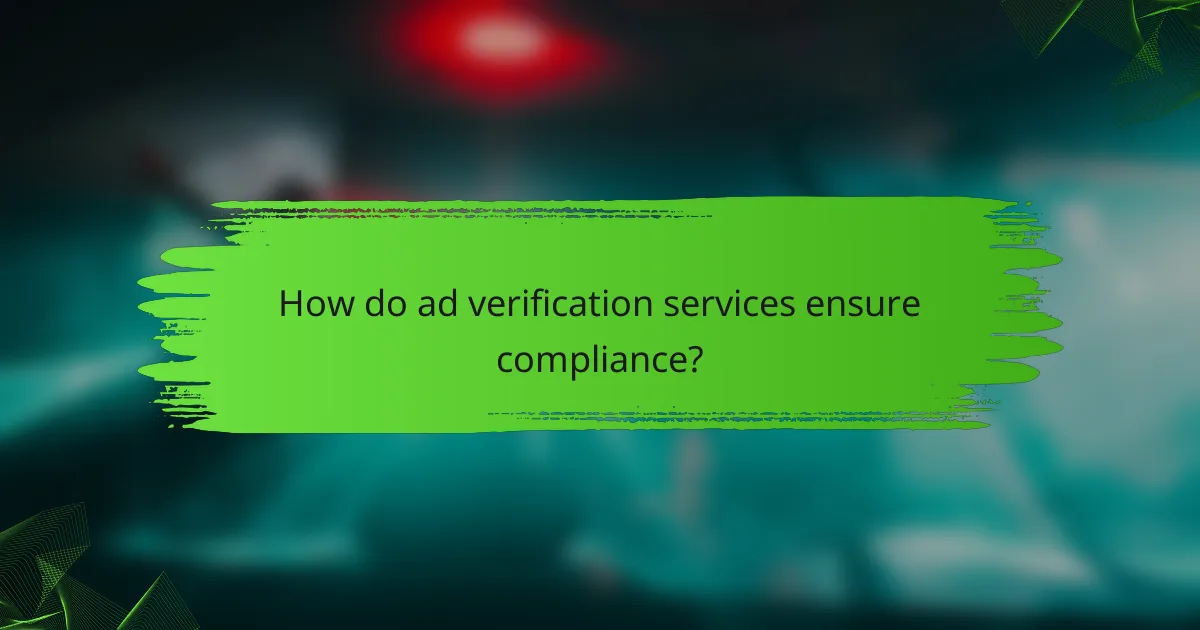Ad verification services are essential for ensuring that digital advertisements are accurately displayed, reach their target audiences, and uphold brand integrity. By providing enhanced transparency and compliance with industry standards, these services protect advertisers from fraud and help ensure that their campaigns are effective and aligned with regulatory requirements.

What are the key roles of ad verification services?
Ad verification services play a crucial role in ensuring that digital advertisements are displayed correctly, reach the intended audience, and maintain brand integrity. These services help advertisers confirm that their ads are placed in suitable environments, free from fraud, and effective in achieving campaign goals.
Ensuring ad placement integrity
Ensuring ad placement integrity involves verifying that advertisements appear on the intended websites and within the correct context. This process includes checking for proper ad formats, placements, and visibility, ensuring that ads are not hidden or misrepresented. Advertisers can use tools that provide real-time monitoring to confirm that their ads are displayed as planned.
For example, if an ad is meant to appear on a reputable news site, ad verification services will confirm that it is not placed on a low-quality or unrelated site. This helps maintain the brand’s reputation and effectiveness of the advertising spend.
Detecting fraudulent activities
Detecting fraudulent activities is a critical function of ad verification services, which identify and mitigate risks associated with ad fraud. This includes click fraud, impression fraud, and ad stacking, where multiple ads are layered on top of each other, leading to inflated metrics. By using advanced algorithms and machine learning, these services can analyze traffic patterns and flag suspicious activities.
Advertisers should prioritize services that offer comprehensive fraud detection capabilities, as this can save significant budget losses. Regular audits and reports can help in identifying trends and preventing future occurrences of fraud.
Enhancing brand safety
Enhancing brand safety means ensuring that advertisements do not appear alongside inappropriate or harmful content. Ad verification services assess the context in which ads are displayed, filtering out sites that may host offensive material or misinformation. This is essential for maintaining a positive brand image and consumer trust.
Advertisers can set specific criteria for acceptable content, and verification services will monitor compliance. For instance, a luxury brand may choose to avoid placements on sites that promote controversial topics or low-quality content.
Improving campaign performance
Improving campaign performance involves analyzing ad placements and audience engagement to optimize advertising strategies. Ad verification services provide insights into metrics such as viewability, engagement rates, and audience demographics, allowing advertisers to refine their targeting and creative strategies.
By leveraging data from verification services, advertisers can make informed decisions about where to allocate their budgets for maximum impact. Regular performance reviews can lead to adjustments that enhance overall campaign effectiveness, ensuring that advertising dollars are spent wisely.

What benefits do ad verification services provide?
Ad verification services offer essential benefits such as enhanced transparency, compliance with industry standards, and protection against ad fraud. These services ensure that advertisements are displayed as intended, meet regulatory requirements, and safeguard advertisers’ investments.
Increased transparency in advertising
Increased transparency in advertising is a key benefit of ad verification services. These services provide detailed insights into where and how ads are displayed, allowing advertisers to track performance metrics and audience engagement accurately.
By utilizing ad verification tools, companies can gain access to real-time data regarding ad placements, viewability rates, and audience demographics. This transparency helps advertisers make informed decisions and optimize their campaigns effectively.
Compliance with industry standards
Compliance with industry standards is crucial for maintaining trust and credibility in advertising. Ad verification services help ensure that ads adhere to established guidelines set by organizations such as the Interactive Advertising Bureau (IAB) and the Digital Advertising Alliance (DAA).
These services often include checks for content appropriateness, data privacy regulations, and adherence to specific advertising formats. By ensuring compliance, advertisers can avoid potential legal issues and enhance their brand reputation.
Protection against ad fraud
Protection against ad fraud is another significant advantage of using ad verification services. These services employ advanced algorithms and monitoring techniques to detect fraudulent activities, such as click fraud and impression fraud, which can drain advertising budgets.
By implementing ad verification, companies can identify suspicious traffic sources and mitigate risks associated with fraudulent clicks or impressions. This proactive approach not only protects financial investments but also improves the overall effectiveness of advertising campaigns.

How do ad verification services ensure compliance?
Ad verification services ensure compliance by monitoring and validating that advertisements meet legal and industry standards. They assess factors such as data privacy, content appropriateness, and adherence to guidelines set by regulatory bodies.
Adherence to GDPR regulations
Ad verification services play a crucial role in ensuring compliance with the General Data Protection Regulation (GDPR) by implementing measures that protect user data. They monitor how personal data is collected, processed, and stored, ensuring that advertisers obtain proper consent from users.
For example, ad verification tools may include features that automatically flag non-compliant ads or track consent management practices. This helps brands avoid hefty fines, which can reach up to 4% of annual global turnover.
Alignment with IAB guidelines
Compliance with Interactive Advertising Bureau (IAB) guidelines is essential for maintaining industry standards. Ad verification services ensure that ads are not only compliant with legal requirements but also align with best practices for transparency and user experience.
These services often provide tools to check for ad quality, viewability, and brand safety, which are all part of IAB’s standards. By adhering to these guidelines, advertisers can enhance their credibility and foster trust with consumers.
Regular reporting and audits
Regular reporting and audits are vital components of ad verification services that help maintain compliance. These services generate detailed reports on ad performance, compliance status, and any issues that arise, allowing advertisers to take corrective action promptly.
Conducting periodic audits can help identify potential compliance gaps and ensure that all advertising practices remain within legal frameworks. This proactive approach not only mitigates risks but also supports ongoing improvements in advertising strategies.

What are the top ad verification tools available?
The top ad verification tools are essential for ensuring that digital advertising meets quality standards and compliance requirements. These tools help advertisers confirm that their ads are displayed in the right context, reach the intended audience, and comply with industry regulations.
DoubleVerify
DoubleVerify is a leading ad verification service that provides insights into ad viewability, fraud detection, and brand safety. It uses advanced algorithms to analyze ad placements and ensure they meet specified criteria, helping advertisers maximize their return on investment.
One of the key features of DoubleVerify is its real-time reporting, which allows advertisers to monitor campaign performance continuously. This tool is particularly useful for brands looking to maintain a strong reputation and avoid negative associations with inappropriate content.
Integral Ad Science
Integral Ad Science (IAS) specializes in measuring and improving the quality of digital advertising. It offers solutions for verifying ad placements, ensuring brand safety, and analyzing audience engagement. IAS is known for its comprehensive analytics that help advertisers make informed decisions.
With IAS, advertisers can access detailed reports on ad performance, including metrics on viewability and engagement rates. This data is crucial for optimizing campaigns and ensuring that ads are not only seen but also resonate with the target audience.
Moat by Oracle
Moat, a product of Oracle, focuses on measuring ad effectiveness and engagement. It provides tools for verifying viewability, detecting fraud, and analyzing consumer attention. Moat’s unique approach emphasizes the importance of understanding how audiences interact with ads.
Advertisers using Moat can benefit from its extensive database and analytics capabilities, which help in assessing the impact of their campaigns. By leveraging Moat’s insights, brands can refine their strategies and enhance overall advertising effectiveness.

How to choose the right ad verification service?
Choosing the right ad verification service involves evaluating features, pricing, and customer support to ensure it meets your specific needs. Focus on services that align with your advertising goals and compliance requirements.
Evaluate service features
When evaluating ad verification services, consider the specific features they offer. Look for capabilities such as fraud detection, viewability measurement, and brand safety checks. A comprehensive service should provide real-time reporting and customizable dashboards to track performance effectively.
Additionally, assess the technology used by the service. Some providers utilize advanced machine learning algorithms for more accurate results, while others may rely on traditional methods. Ensure the service can integrate seamlessly with your existing advertising platforms.
Consider pricing models
Pricing models for ad verification services can vary significantly, typically falling into categories like subscription-based or pay-per-use. Subscription models often provide a flat monthly fee, which can be beneficial for budgeting, while pay-per-use may be more cost-effective for occasional campaigns.
Compare the costs against the features offered. A higher price may be justified if the service provides superior technology or additional features that enhance your advertising effectiveness. Always request a demo or trial to gauge value before committing.
Assess customer support options
Strong customer support is crucial when selecting an ad verification service. Check if the provider offers 24/7 support through multiple channels, such as phone, email, or live chat. Quick response times can be vital in resolving issues that may arise during campaigns.
Additionally, consider the availability of resources like training materials, FAQs, and community forums. A service that provides comprehensive onboarding and ongoing education can help you maximize its features and ensure compliance with industry standards.

What are the challenges in ad verification?
Ad verification faces several challenges, primarily due to the rapid evolution of technology and increasing privacy regulations. These challenges can hinder the effectiveness of ad campaigns and compliance with legal standards.
Keeping up with evolving technologies
The digital advertising landscape is constantly changing, with new technologies emerging regularly. Ad verification services must adapt to these advancements, such as programmatic advertising and artificial intelligence, to ensure accurate tracking and reporting.
For example, the rise of connected TV (CTV) and mobile advertising requires verification tools to support various formats and platforms. Staying updated with these technologies is crucial for maintaining the integrity and effectiveness of ad campaigns.
Addressing privacy concerns
Privacy regulations, such as the General Data Protection Regulation (GDPR) in Europe and the California Consumer Privacy Act (CCPA) in the United States, pose significant challenges for ad verification. These laws require strict compliance regarding user data collection and usage, impacting how verification services operate.
To navigate these concerns, advertisers should implement transparent data practices and ensure that their ad verification partners comply with relevant regulations. This may involve regular audits and updates to privacy policies to maintain consumer trust and avoid potential fines.



